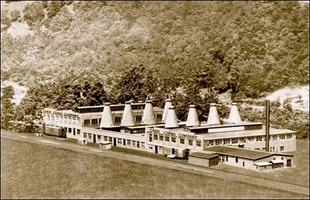 | Back to e-WV
| Back to e-WV
 The West Virginia Encyclopedia
The West Virginia Encyclopedia
 | Back to e-WV
| Back to e-WV
 The West Virginia Encyclopedia
The West Virginia Encyclopedia

The pottery factory that was to become Carr China Company was established in 1913 as the Consolidated Manufactories Company by the Merchants Association of Grafton. Begun as a community economic development project, the company built the brick, seven-kiln, 108,000-square-foot pottery plant to employ 250 people. The original company operated the pottery for two years but was declared bankrupt on January 1, 1916.
In June 1916, members of the Speidel, Bachmann, and Carr families brought Thomas Carr, the president of the Warwick Pottery Company in Wheeling, to take over the Grafton pottery. The new operation was called Carr China Company. After Thomas Carr’s retirement in 1923, Carr China successfully competed in the hotel ware market for 30 more years.
Carr China made all types of dishware to prepare and serve food and beverages. It also made smoking accessories and special ware for hospitals. Carr China salesmen sold to many of the nation’s restaurants, resorts, hotels, and hospitals. They also provided ware for West Virginia’s state parks and the Jackson’s Mill 4-H Center.
Carr China designs included Blue Willow, Dolly Varden, Dresden, Empire, Glo-tan, Rho-dendra, Roanoke, and many others. The names are on many pieces of ware.
As World War II approached, Carr built extra warehouses to stockpile necessary English clay. It supplied chinaware to the armed forces, and Carr’s handle-less mugs became well known to servicemen. After the war, competition with plastics and recovering foreign factories forced the Carr China Company out of business in 1953.
Written by James R. Mitchell
Taylor County Historical & Genealogical Society. A History of Taylor County. Parsons: McClain, 1986.